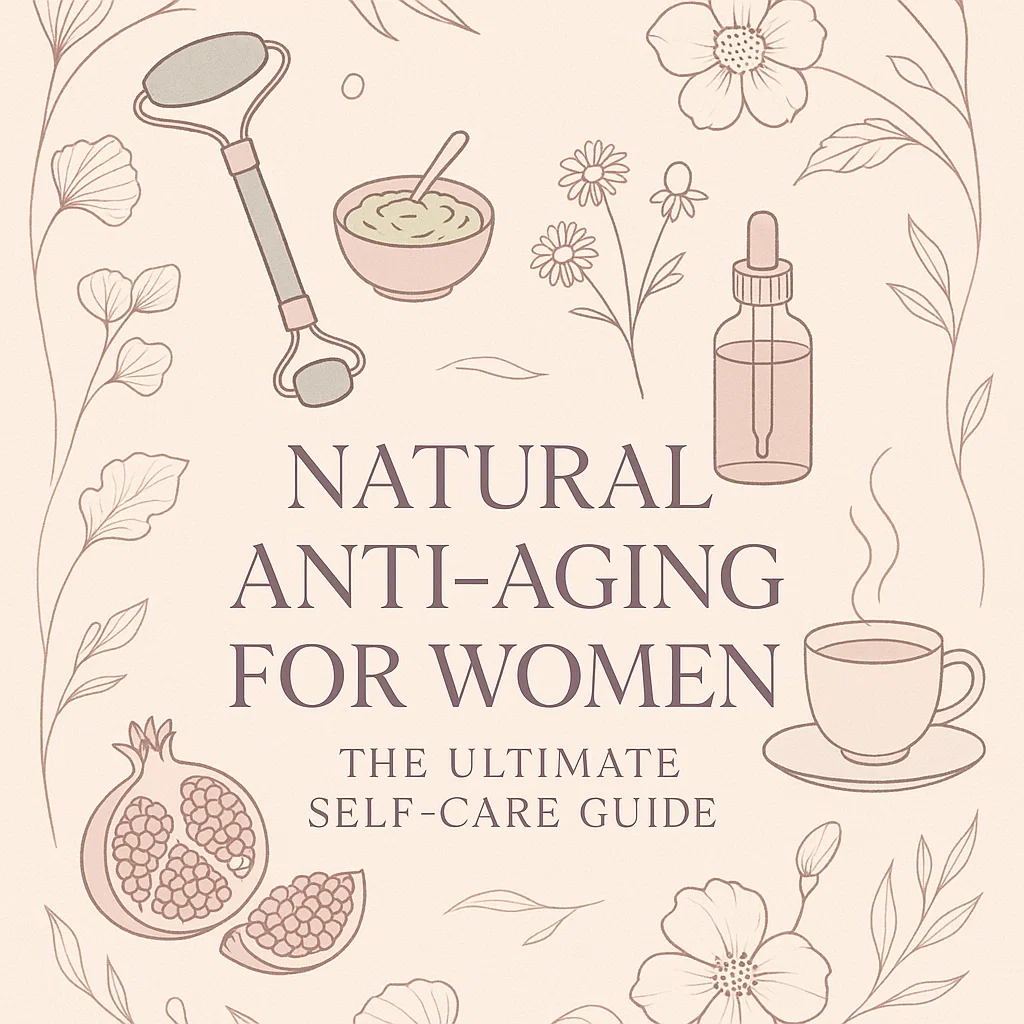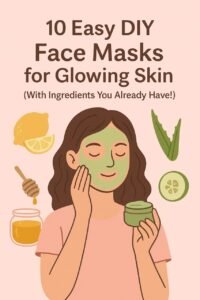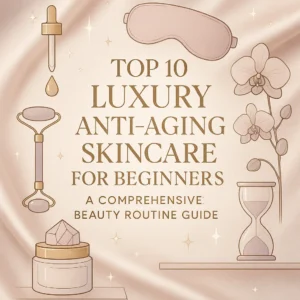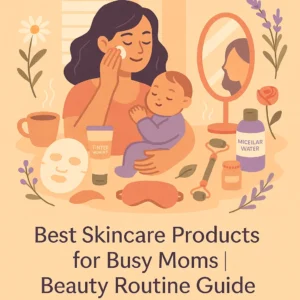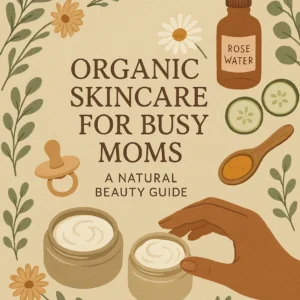Natural Anti-Aging for Women: The Ultimate Self-Care Guide
Aging is natural, but women of all ages can age gracefully by embracing natural anti-aging for women strategies rooted in holistic self-care. This ultimate guide explains how lifestyle, diet, skincare, and mindful habits combine to promote youthful, healthy skin and body. We’ll cover research-backed tips – from nutrition and exercise to sun protection and supplements – that empower adult women to support their natural glow and slow aging.
Understanding how skin ages is key. By their 30s and beyond, many women notice fine lines, dryness, and loss of firmness. Genetic factors drive “intrinsic aging,” but our daily choices – sun exposure, diet, habits – cause “extrinsic aging.” Dermatologists emphasize that many aging signs can be minimized with preventive self-care. In other words, natural anti-aging for women isn’t about gimmicks; it’s about healthy routines. This guide will help you build a complete self-care routine to nourish skin and body, backed by science and experts.
Nutrition & Hydration: Foundations of Natural Anti-Aging for Women
What you eat and drink profoundly affects how your skin looks. A balanced, nutrient-rich diet is one of the top natural anti-aging for women habits. Board-certified dermatologists note that “eating plenty of fresh fruits and vegetables may help prevent damage” that leads to premature aging, while high sugar and processed carbs can accelerate wrinkles. In practice, focus on whole foods:
- Colorful fruits and vegetables: Berries, leafy greens, oranges and carrots are rich in antioxidants (vitamins C, A, E, polyphenols) that neutralize free radicals. Vitamin C, for example, is a powerful antioxidant that “removes reactive oxygen species (ROS) or free radicals” in skin, protecting collagen. It also promotes collagen gene expression, helping keep skin supple and firm.
- Lean proteins and healthy fats: Foods like fish, poultry, beans and nuts provide amino acids and omega-3 fatty acids which support cell repair and hydration. Omega-3s (in salmon, walnuts, flaxseed) help maintain skin’s lipid barrier and have anti-inflammatory effects. Collagen peptide supplements or bone broth supply the raw materials for skin collagen. In fact, studies show that oral collagen supplements significantly improve skin hydration and elasticity. A systematic review found that collagen boosts moisture and reduces wrinkles. (Tip: choose hydrolyzed collagen peptides with vitamin C for best absorption.)
- Whole grains and legumes: Foods rich in fiber and B vitamins help regulate hormones and digestion. Niacinamide (vitamin B3), found in whole grains and nuts, is a topical skin-care hero: studies showed it reduces fine lines and wrinkles and improves elasticity.
- Hydration: Drink plenty of water throughout the day. Hydration plumps skin cells from within. Moist, supple skin reflects youth. Aim for at least 8 glasses per day, more if active or in dry climates. Herbal teas and water-rich foods (cucumber, watermelon) count too. Avoid dehydrating drinks (excess alcohol or caffeine).
- Limit sugar and processed foods: Dermatologists warn that “a diet containing lots of sugar or other refined carbohydrates can accelerate aging”. Excess sugar binds to collagen fibers (glycation), making skin stiff and wrinkled. Reduce sweets, white bread, and fried junk, and instead reach for whole, natural foods.
Staying hydrated and nourished from the inside lays the groundwork for naturally glowing skin. A diet rich in antioxidants and nutrients gives women a powerful anti-aging boost.
Sun Protection & Gentle Skincare: Natural Defense Against Premature Aging
The sun is the #1 cause of extrinsic skin aging. UV rays break down collagen and form wrinkles, sunspots and leathery texture. To reverse or prevent this, daily sun protection is non-negotiable. Board-certified dermatologists strongly advise women to “protect your skin from the sun every day” with broad-spectrum sunscreen (SPF 30 or higher). This means applying sunscreen to any exposed skin (face, neck, arms) every morning, even on cloudy days. Look for formulations labeled “broad-spectrum” and reapply if outdoors. Also wear protective clothing, hats and sunglasses outdoors. Choosing self-tanners or bronzers instead of real tanning is another way to avoid UV damage.
In addition to sun care, a gentle daily skincare routine is crucial:
- Cleanse gently: Use a mild, hydrating cleanser day and night to remove makeup, sunscreen, and pollutants. Avoid harsh scrubs or aggressive chemicals that irritate skin. Dermatologists caution that rough scrubbing “can irritate your skin, and irritate your skin accelerates skin aging”. Instead, wash with lukewarm water and your fingertips, patting skin dry softly.
- Moisturize daily: Trapping moisture keeps skin plump and wrinkle-free. After cleansing, apply a moisturizer suited to your skin type (creams, lotions, or oils). Experts note that “moisturizer traps water in our skin, giving it a more youthful appearance”. Ingredients like hyaluronic acid (naturally in skin) and glycerin draw hydration into cells. Natural oils such as jojoba, argan, or squalane mimic skin’s own oils and lock in moisture without clogging pores.
- Use antioxidants topically: Serums or creams containing vitamins C and E, green tea extract, or niacinamide (B3) can neutralize environmental free radicals right on the skin’s surface. For example, vitamin C serums brighten skin and inhibit pigment. Topical niacinamide has been shown to improve wrinkles and elasticity. When shopping for products, choose those labeled as “for sensitive skin” or “irritation-free.”
- Avoid irritants: If a product stings or burns, stop using it. Skin that “stings or burns” is irritated, and irritation can make you look older. Instead choose fragrance-free, gentle products. Limit chemical peels and alcohol-based toners.
- Eye and neck care: Don’t forget thin, delicate areas. Use a gentle eye cream with peptides or antioxidants for crow’s feet, and apply sunscreen or moisturizer on the neck and chest too.
By combining sun-safe habits with a nurturing skincare routine, women can support the skin’s natural renewal and dramatically slow premature aging. Protecting and repairing the skin barrier is a cornerstone of natural anti-aging self-care.
Healthy Lifestyle Habits for Natural Anti-Aging
Anti-aging extends beyond skin-deep. Overall wellness habits have profound skin benefits:
- Regular exercise: Moving your body isn’t just for weight control. Exercise improves circulation and nutrient delivery to skin. Dermatologists observe that “moderate exercise can improve circulation and boost the immune system, giving the skin a more youthful appearance”. Aim for at least 30 minutes of moderate activity (brisk walking, cycling, yoga, dancing) most days. Strength training and weight-bearing exercise help preserve muscle mass and bone density as women age, keeping bodies and skin toned. Even simple face exercises (“face yoga”) can help: a 20-week facial exercise program produced noticeable lifting and fullness in cheeks, with participants appearing on average 2.7 years younger. Incorporate some facial muscle training or massage into your routine for extra benefit.
- Quality sleep: Aim for 7–9 hours of restful sleep each night. Skin cells repair and regenerate during deep sleep. Chronic poor sleep is linked to uneven skin tone, fine lines, and reduced elasticity. In contrast, healthy sleep reduces the stress hormone cortisol; high cortisol levels (due to stress or sleep deprivation) accelerate collagen breakdown. In short, chronic stress and lack of sleep age skin faster. To help your body rejuvenate, develop a calming bedtime routine (dim lights, gentle stretching, meditation or reading) and keep a consistent sleep schedule.
- Stress management: Mind-body health reflects on your face. Chronic stress produces cortisol and inflammation that can cause breakouts, dullness, and wrinkles. Natural stress-busters like meditation, deep breathing, journaling, or yoga can improve skin tone. Even laughter and social connection have been shown to lower stress hormones. Consider this part of self-care: scheduling “me-time” for relaxation is an investment in long-term beauty.
- Quit smoking and limit alcohol: These simple lifestyle changes are some of the most effective anti-aging steps. Smoking “greatly speeds up how quickly skin ages,” causing wrinkles, fine lines, and a dull complexion. If you smoke, quit – former smokers often notice their skin improves once they stop. Alcohol, meanwhile, is dehydrating and inflammatory. Even moderate drinking over time makes skin look older. Dermatologists warn that alcohol “dehydrates the skin, and in time damages the skin. This can make us look older”. Staying away from tobacco and limiting alcohol are two powerful natural anti-aging acts.
Together, an active, well-rested, stress-managed lifestyle builds resilience against aging. When women of all ages adopt these habits, they not only feel healthier but often find their skin looking younger and more vibrant.
Natural Anti-Aging Supplements & Ingredients
Certain supplements and topical ingredients can complement your routine. Use them to support – not replace – the foundations above:
- Collagen peptides: As noted, oral collagen has shown measurable skin benefits. Taking 2.5–10 grams per day of high-quality hydrolyzed collagen can improve skin hydration and elasticity in 8–12 weeks. Studies found significant gains in moisture and firmness with regular collagen supplementation. Look for collagen from fish or bovine sources, often combined with vitamin C to maximize absorption. While collagen supplements aren’t “miraculous,” they are one of the few nutrient therapies backed by clinical evidence for skin aging.
- Antioxidant vitamins (C, E): Oral and topical vitamin C and E both help protect against photoaging. Vitamin C (ascorbic acid) is essential for collagen production and skin defense. It “attenuates photoaging and natural aging of the skin by reducing oxidative stress”. Incorporate a daily vitamin C supplement or apply a vitamin C serum in the morning. Vitamin E (found in nuts, seeds, avocado) also defends against free radicals. A combination of vitamins C + E is more effective together, protecting skin cells and promoting healing.
- Niacinamide (Vitamin B3): This versatile vitamin supports the skin barrier and evens tone. Topical 4–5% niacinamide creams are clinically proven to improve elasticity and reduce wrinkles. Niacinamide is very gentle – suitable for sensitive skin – and can often be found in creams labeled for aging or sensitive skin.
- Hyaluronic Acid: A natural moisturizing molecule in skin, hyaluronic acid holds 1000x its weight in water. Use hyaluronic acid serums or moisturizers to boost hydration in the skin’s surface layers. While your body makes less HA with age, topical HA draws water into the skin, smoothing fine lines.
- Botanical oils: Natural plant oils can nourish and hydrate. Organic jojoba, argan, or almond oil are rich in fatty acids and vitamin E, and mimic skin’s own oils (jojoba is nearly identical to sebum). Gently massaging a few drops into the face can improve moisture. Rosehip oil (with natural vitamin A) is often used to support skin repair. Of course, always patch-test new oils to avoid irritation.
- Herbal extracts: Some herbs and supplements are traditionally used for aging skin. For example, green tea extracts (EGCG) have photoprotective antioxidants. Gotu kola (Centella asiatica) is believed to stimulate collagen; studies in cells show it can promote new collagen formation. Ashwagandha (an adaptogenic herb) supports stress relief and has antioxidant properties. While herbal effects are usually mild, they can be part of a holistic regimen if you find them beneficial.
- CoQ10 and other nutraceuticals: Coenzyme Q10 levels decline with age. Some evidence suggests topical CoQ10 can support cell energy and reduce wrinkles. Similarly, omega‑3 supplements (fish oil) support skin barrier health and may reduce inflammation. Always choose high-quality supplements and discuss with a doctor if you have health conditions.
In short, supplements like collagen, antioxidants, and barrier-supporting nutrients can bolster the skin’s own defenses. However, don’t rely on pills alone. No supplement can undo sun damage or substitute for healthy lifestyle – so use them as enhancements to a strong foundation.
Self-Care Rituals: Facial Exercises & Mindful Beauty
Beyond diet and products, self-care for aging women also includes special rituals:
- Facial exercises (Face Yoga): Training the facial muscles can improve tone and fullness. A clinical trial found that practicing facial “yoga” exercises (30 minutes per day for 20 weeks) resulted in noticeably fuller cheeks and a 2.7-year younger appearance. Simple exercises like “puffer fish cheeks,” “smiling fish,” or cheek lifts can be done at home. These increase blood flow and may strengthen the muscles under the skin, counteracting sagging.
- Massage and gua sha: Regularly massaging the face with upward motions can boost circulation and lymphatic drainage, reducing puffiness and improving skin tone. Tools like jade rollers or gua sha stones can assist gentle massage when used with a facial oil or serum. This promotes a healthy glow and can ease tension in facial muscles.
- Relaxation rituals: A weekly at-home “spa night” can be part of anti-aging self-care. Apply a hydrating face mask (for moisture or antioxidants), then follow with moisturizer and a soothing scalp or neck massage. Light a candle, play soft music – these rituals reduce stress, which in turn benefits skin. Think of them as rejuvenation time for both body and mind.
- Hydration breaks: Keep a glass of water on your desk or nightstand. Drinking water regularly (sometimes with a slice of lemon or cucumber) reminds you to stay hydrated. Good hydration supports digestion, which in turn influences skin clarity and moisture.
These practices not only feel good, they do work by increasing circulation, boosting collagen over time, and combating tension. Combined with the habits above, they round out a comprehensive natural anti-aging self-care routine.
Wrapping It All Up
Natural anti-aging for women is a multi-faceted approach. There’s no magic pill, but consistent self-care can make a dramatic difference. Key takeaways:
- Protect and repair skin daily: Sun protection (SPF 30+) and gentle skincare (cleanse, moisturize, antioxidants) is fundamental.
- Live healthily: Maintain a balanced diet rich in antioxidants and collagen-supporting nutrients, exercise regularly, sleep well, and manage stress. Avoid smoking and excess alcohol.
- Use smart supplements and ingredients: Consider adding collagen peptides and vitamin C, E, and niacinamide to your regimen, but remember they complement – not replace – the basics.
- Embrace self-care rituals: Gentle facial exercises, massage, and mindful relaxation are not just luxuries; they actively support skin tone and health.
- Be patient and consistent: Most changes (like wrinkle reduction or hydration gains) happen over weeks to months. Keep your focus on long-term wellness, and celebrate gradual improvements.
By following this self-care guide, adult women can optimize their natural anti-aging for women journey. These practices are safe for most and focus on wellness – you’ll look better and feel better.
FAQ
Q: What is natural anti-aging for women and does it really work?
A: Natural anti-aging for women refers to lifestyle and skincare practices that support youthful skin and health without harsh procedures or chemicals. It works by addressing the root causes of aging – oxidative stress, inflammation, collagen loss – with things like a healthy diet, sun protection, and antioxidants. While genetics and time play a role, adopting these habits can significantly slow visible aging. For example, studies show daily sun protection and vitamin-rich diets lead to fewer wrinkles and brighter skin.
Q: Which foods help fight aging in women?
A: Antioxidant-rich foods are key. Berries (blueberries, strawberries), leafy greens (spinach, kale), citrus fruits (oranges, kiwi) and tomatoes are packed with vitamins C and E that protect collagen. Fatty fish (salmon, mackerel) provides omega-3s for skin hydration, and nuts/seeds (almonds, walnuts) deliver vitamin E and selenium. Low-sugar whole grains and beans help regulate hormones. Studies note diets high in fruits and vegetables may prevent skin damage from aging.
Q: Do collagen supplements or vitamins really improve skin aging?
A: There is scientific evidence they can help. A meta-analysis found that women taking hydrolyzed collagen saw significant improvements in skin hydration and elasticity compared to placebo. Similarly, a review of trials showed collagen supplements improved skin moisture and reduced wrinkles. Vitamins like C and E are also proven antioxidants. However, experts emphasize that collagen or vitamins should supplement a healthy lifestyle. In fact, Harvard researchers caution that sun protection and topical retinoids have the strongest evidence for minimizing wrinkles. So think of collagen and vitamins as helpful aids, not miracle cures.
Q: How often should women exercise or do facial exercises for anti-aging?
A: Regular aerobic exercise (most days of the week) supports youthful skin by boosting circulation. For facial exercises (“face yoga”), consistency is key: a study had women do 30-minute routines every day for 8 weeks, then alternate days for 12 more weeks. By week 20 they saw improved cheek fullness and appeared 2.7 years younger on average. You can start with 15–30 minutes of facial movements daily and adjust from there.
Q: What skincare routine is recommended for natural anti-aging?
A: A gentle, consistent routine is best. Cleanse twice daily with a mild cleanser, then apply a broad-spectrum SPF30+ sunscreen each morning. At night, use a hydrating moisturizer or serum (with ingredients like hyaluronic acid, vitamin C, peptides). Incorporate a topical retinol or botanical alternative to boost cell turnover, and consider serums with antioxidants (vitamins C/E or niacinamide) to repair damage. Always remove makeup before bed. The American Academy of Dermatology suggests keeping skin clean and protected, and avoiding anything that irritates or burns.
Q: Can stress or lack of sleep really affect my skin’s aging?
A: Absolutely. Poor sleep and chronic stress raise cortisol levels, which break down collagen and weaken skin’s repair. One study found that people with poor sleep have more signs of skin aging (fine lines, uneven tone, less elasticity). Maintaining 7–8 hours of quality sleep nightly and using stress-relief techniques (meditation, gentle exercise) helps your body regenerate cells and produce healing hormones, keeping your skin healthier. In short, beauty sleep is real – it’s a simple natural anti-aging tactic.
Q: Are anti-aging products marketed for women necessary?
A: Not always. Many products promise quick fixes but aren’t better than core practices. Protecting skin from sun damage and eating well often gives more benefit than expensive creams. However, targeted serums (with proven actives like vitamin C or bakuchiol, a plant-based retinol alternative) can enhance results. If you use products, choose ones with minimal additives and clinically backed ingredients. The most important “product” is sunscreen – it’s been shown to prevent premature wrinkles and spots when used daily.
By combining these tips into your daily routine, you’re applying the best natural anti-aging for women advice out there. It’s not about quick fixes; it’s about consistent, research-backed self-care. Over time, these healthy habits will help your skin stay radiant and resilient at any age.
Sources: Information above is supported by dermatologists and recent research.

